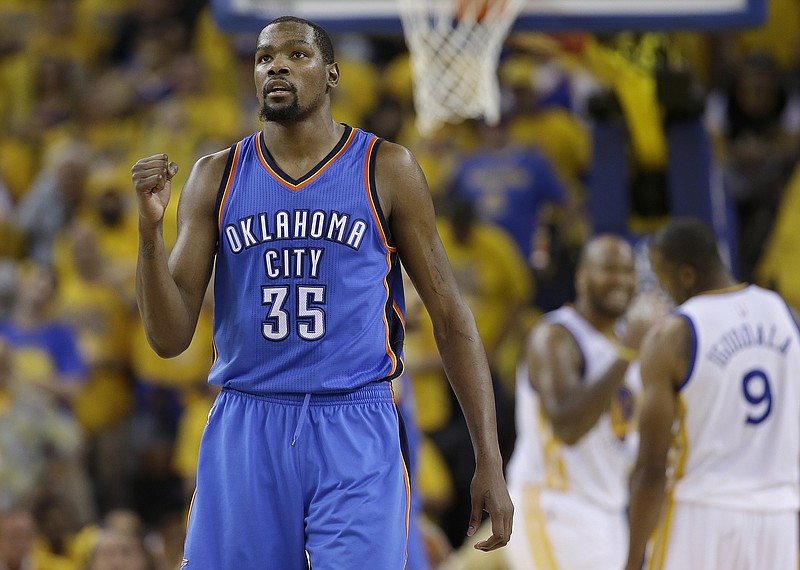There is no loyalty from sports superstars.
That's the easy narrative this week after Kevin Durant left his team for a better chance at winning and Dwyane Wade left his to chase a few extra million bucks.
Durant picked up his stakes in Oklahoma City and went to the Golden State Warriors, who won a record 73 regular-season games without Durant. He joins Steph Curry on a roster that now owns the last three MVP awards.
The face of the Miami Heat franchise who has agreed to sign with Chicago, Wade is the latest huge-name superstar to pull up stakes and follow the payday.
In truth, Wade was less about money and more about a perceived lack of respect - a lack of respect for the greatest professional champion in the city's history. A lack of respect that sent Wade north for a relative push in finances, considering Florida does not have a state income tax.
The player is always the easy target, because the idea of the player having the power is foreign to so many of us. Yes, it's the player who makes millions playing a kid's game. But Wade took less money six years ago to help the Heat put together the super powers of LeBron James and Chris Bosh and win two titles in four consecutive trips to the NBA Finals.
Plus, that angst toward the player alone is letting the team and the franchise off too easy, considering the owners are making hundreds of millions having stars such as Wade play a kid's game in their arenas.
That's a fair statement, too, in Durant's case, since teams spend every offseason trying to do everything they can to give themselves the best chance to win.
That's not betrayal or cheating or any of the claims made against Durant for his decision to make the best team on paper in the NBA even better. If a general manager made that kind of improvement for his situation to win a title, he'd get a contract extension.
Yes, Wade and Durant were the faces of their franchises.
Where's the loyalty from the top down?
Yes, side with management if you think letting Wade walk for millions of dollars was a good idea. Maybe keeping him at any cost was questionable considering his health and his relentless style that adds so much wear and tear on his 34-year-old body. Maybe the Heat and front office guru Pat Riley are right that Wade is overvalued at the price tag he was asking.
But Chicago didn't think so and ponied up the coin.
And Wade took it. Can you blame him? Would you have left $10 million on the table on what almost assuredly will be the final big contract of his professional life?
Of course not.
And the double-edged sword of teams wanting superstars to take a discount so the teams can fit more talent under the salary cap is becoming tired, and in truth it's such a flawed excuse from the view of management.
First, know this: The NBA salary cap is not a hard cap like the NFL's. It is a flexible cap, especially when it comes to retaining players already on your team. Yes, there are slots and requirements, but teams can exceed the $94.1 million cap in a lot of ways, and when they do they have to pay a "luxury" tax to the rest of the league.
Now, this "hometown" discount of a star taking less to help bolster the roster is a trendy talking point right now, but that unfairly puts too much of the business end and the sacrifice on players like Wade.
Take Tim Duncan, who accepted under-market value in recent years so he could stay in San Antonio and play with teammates he likes and with a franchise that always contends.That's cool, and those are tangible parts of the employee-employer exchange. Working conditions, successful operation, morale and atmosphere all count in real-world ways. But to expect that type of sacrifice from every superstar, and to label the ones not willing to make it as players "who don't want to win," is hypocritical.
Are owners lowering ticket prices so fans can experience Tim Duncan at a discounted rate? Are they turning back TV money in a good-faith effort to do all they can for the organization?
Yes, it hurts more because we are connected to our favorite teams and the stars that make them competitive and fun to watch. It hurts even the casual fan who appreciates the legends such as Jeter or Ripken or Brady or Kobe who played their entire career in one city.
Yes, there's no longer loyalty in sports, but that dead end is a two-way street.
No, there's no loyalty in sports, because sports is a huge business. And we all know there's no loyalty there, either.
Contact Jay Greeson at jgreeson@timesfreepress.com and 423-757-6343. Follow him on Twitter at twitter.com/jgreesontfp.
